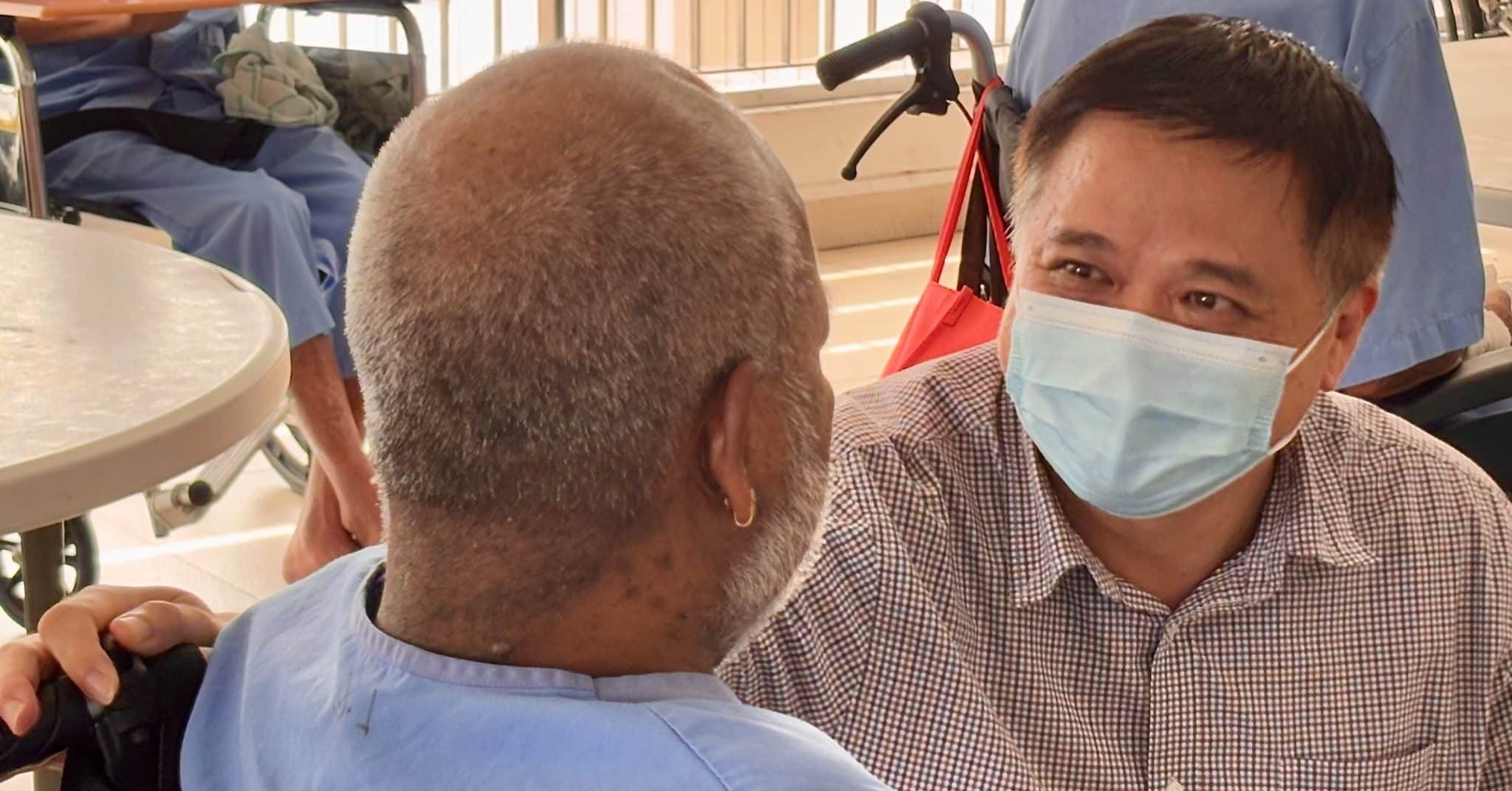Caring for my suicidal daughter: A pastor’s story
On World Suicide Prevention Day (September 10), Salt&Light recognises all who journey with those struggling with suicide.
Our Daily Bread Ministries // September 8, 2023, 4:12 pm

"My daughter’s condition has taken a toll on my marriage, family, work and relationship with God," says the writer. "And yet ... in spite of all this, and in the midst of all this, God’s invisible arm upholds me." Posed photo by Milada Vigerova on Unsplash.
TRIGGER WARNING: This story contains mention of self-harm and suicide that some may find distressing. Reader discretion is advised.
It all started during the Covid-19 pandemic. My daughter had just turned 12, and was taking her Primary School Leaving Examinations (PSLE) that year.
When the first lockdown happened, she started to feel lonely and isolated. She had always been a sociable girl, so when she couldn’t go to school, meet her friends, or leave the house, she became more and more withdrawn. She also started getting increasingly anxious over her studies and major exams.
That was when the self-harming started. She made small cuts on her upper thighs, where they couldn’t be seen easily. Her friend noticed them one day, and urged her to tell us.
One day, my daughter came to me and said: “Daddy, I have something to show you.”
When I saw the cuts, my heart broke. I was stunned. She told me that the cutting helped her to feel better, because it relieved the stress and pain that she was feeling in those moments. No matter how much I tried to dissuade her, she could not be talked out of it. I chalked it up to stress over the PSLE, but I was wrong.
Dealing with triggers
Things worsened after her PSLE. During the December school holidays, she experienced insomnia, and stayed in bed all day.
Even when she moved on to secondary school and physical classes resumed, she continued to self-harm.
No matter how much I tried to dissuade her, she could not be talked out of it.
She would get triggered by specific things, such as not getting her way or what she wanted immediately. She would also get upset by things her friends did – such as excluding her from outings or conversations – or things her teachers said.
Then, she tried killing herself.
The first time, she overdosed on painkillers. She swallowed more than 20 pills, and only confessed to it four days later when she started experiencing stomach pain. We took her to the hospital to be treated, and she had to stay in the psychiatric ward for three weeks after.
The second time, she tried to hurl herself out of the window. I wrestled with her for 30 minutes, clinging onto her as she screamed and fought me. It took four firefighters – all full-grown men – to pin her down and handcuff her.
I will never forget that scene: the flashing lights of the police cars, fire engine, and ambulance, all the officers and chaos surrounding us, and my daughter strapped to the stretcher in handcuffs.
Before her mental illness
My daughter had not always been this way. As a young girl, she was cheerful, outgoing and friendly. But she was also sensitive and emotional. She would throw tantrums whenever she didn’t get her way.
I wonder what happened to my sweet little girl.
A counsellor once remarked that she was both stubborn and sensitive – “a deadly combination”.
We have always been close – when people asked her whom she could share things with, she would reply: “Daddy.” Whenever my favourite band toured in Singapore, she would ask why I didn’t attend their concert. The tickets were too expensive and I would never dare spend that kind of money, I would tell her.
Earlier this year, she used all the money she had received for her birthday to buy me a ticket for their concert that will happen later this year. In my heart, I thought: I won’t be able to watch them perform if you’re no longer around.
It pains me to see what is happening to her. Perhaps it is a father-daughter thing; I feel like I am the most affected – even shattered – by her mental illness. I wonder what happened to my sweet little girl.
Her only respite
Over the past three years, we have been in and out of hospitals countless times, and talked to numerous psychiatrists, psychologists, therapists, counsellors and teachers.
When my daughter’s self-harm first started, a psychiatrist diagnosed her with depression and anxiety.
After she tried to kill herself for the third time – breaking into our locked medicine cabinet and overdosing on antidepressants – she was diagnosed with significant emotional dysregulation. This means that she has difficulty managing her emotions, which results in angry outbursts, anxiety, self-harm and suicidal thoughts.
Cutting herself gives her relief, she once said. It’s only when she feels pain and draws blood, that her tension and hostility melts away. It is her only form of respite, she says.
The weight on my shoulders
My daughter’s condition has taken a toll on my marriage, family, work and relationship with God. My wife and I have clashed over how we should handle our daughter’s condition because of our very different parenting styles and views on boundaries and discipline. My wife feels that I am too permissive; I feel that she is too harsh.
Meanwhile, my son feels that we are spoiling her. He often gets into arguments with her over her behaviour. “I don’t understand what’s wrong with you. You have nothing to be unhappy about!” he often shouts at her.
I’ve had to preach about God’s goodness on the pulpit publicly, while struggling with my own faith privately.
At work, I’ve had to leave meetings early whenever I received a call about a crisis at home. I’ve had to carry on with my pastoral and preaching responsibilities while worrying about my daughter’s safety. I’ve had to preach about God’s goodness on the pulpit publicly, while struggling with my own faith privately.
At night, I toss and turn, unable to fall asleep because of my insomnia. I have often woken up in the middle of the night, my heart racing, to check on my daughter to see if she was still alive.
Sometimes, I just cry and pray when I’m in the shower and in my office. These are the only two places where I can be truly alone and pour out everything to God. I’ve been flooded with guilt as I think about the past. Did I do something wrong when she was younger? Was I too harsh? Could I have prevented this?
As a pastor, I need to be convicted by what I’m preaching. And yet, there have been so many times when I have felt that God is silent. It almost feels like Scripture is mocking me.
God’s grip on my girl
And yet … in spite of all this, and in the midst of all this, God’s invisible arm upholds me.
As I continue to read and wrestle with His Word, He has given me comfort. One verse that I hold close to my heart is Psalm 27:13–14:
I remain confident of this:
I will see the goodness of the LORD
in the land of the living.
Wait for the LORD;
be strong and take heart
and wait for the LORD.
I’ve also been reading the book of Job as part of my daily devotions, along with books on suffering and God’s seeming silence. They’ve helped me to realise that there are times that God may feel silent, but He is still present with me. Reading their accounts, and knowing that I’m not alone in my pain, have helped me to take small steps of faith despite the darkness that surrounds me and my family.
There are times that God may feel silent, but He is still present with me.
The Lord has also sent His people to comfort me. Two days after my daughter tried to jump out of the window, I gave a sermon at a church wedding, where a former church member whom I had not talked to in over a decade came over to greet me.
She knew nothing of my family’s situation, but as we were chatting, she suddenly said: “Pastor, I feel like God wants me to tell you something.”
Then she said — and I will never forget her exact words – “I feel like He wants me to tell you, God has got your daughter in His grip.”
Her words pierced me and sent me back to the moment I was clinging to my girl for dear life, less than 48 hours ago. For that half an hour, I had held on desperately and fearfully as she had struggled against me, crying out to God to help me hold on to her. If I had let go, she would have died before my very eyes.
And yet, God was now telling me: I’m the one holding onto her. She is safe in My grip.
No end in sight
My daughter still experiences emotional outbursts today. She’s stopped all medication and therapy because she doesn’t like the side effects – the emotional numbness and drowsiness affect her studies. She’s also had run-ins with the psychologists and therapists assigned to her.
I don’t want her to feel that she has to put on a show for others just because she is a pastor’s daughter.
But I’m thankful that she has not self-harmed in over a month. I count the days in this way now.
My wife and I have also started seeing a Christian counsellor, who has helped us to make sense of our different parenting styles and how we can relate to our daughter better. I now have a better understanding of why my wife reacts the way she does, knowing that it partly stems from her own childhood trauma and experiences.
And while my son still has a tense relationship with his sister, I try to spend more time with him so he doesn’t feel neglected.
My daughter, too, is wrestling with her own faith. She feels angry and disappointed with God for not answering her prayers to heal her. Sometimes, she refuses to attend church. I don’t force her. I don’t want her to feel that she has to put on a show for others just because she is a pastor’s daughter.
The only thing I can do
For now, all I can do for my daughter is to show her that I love her – unconditionally. No matter how difficult or demanding she is, no matter how tired or upset I am. Whether it is by being present with her in her pain, patient with her when she is challenging or upsetting me, or praying with her when she allows it.
All I can do for my daughter is to show her that I love her – unconditionally.
I take comfort in the fact that she is still willing to join us for church service at times, and allows me to pray for her once in a while. Sometimes, she even utters an “amen” at the end of my prayers for her.
Occasionally, during my sermons, I would briefly share with the congregation about what’s happening in our family. I don’t share specific details, but just enough for them to keep us in prayer.
I sometimes wonder whether I’m oversharing – after all, I am a pastor and leader. I don’t know whether some disapprove of my openness and vulnerability, but I do know that my sharing has encouraged more of my members to feel more comfortable about pouring out their own struggles to me.
Once, a young woman approached me after service. Her arms, which bore scars that have faded with time, now carried a baby. “I used to be like your daughter,” she said. “And now, I’m a mother myself.”
Hearing stories like this gives me strength to go on. I know that if I can see my daughter through this, she will grow up to be a beautiful, caring, loving woman.
What the Church can do
In the meantime, I hope that members of the body of Christ can come together to better support families in similar situations. Knowing that there is a group of brethren who will persevere in praying for us, for example, can be a huge source of comfort.
If there’s anything at all that we can do, it is to be a listening ear—without being quick to offer advice or judgment.
I know that it can be tiring to journey with people who are facing protracted trials and tribulations that seem unending. When I update my prayer partners on the latest crisis developing in our home, I can sense the fatigue in some of them. I can understand this – after all, it has been almost three years since this journey of caring for our suicidal daughter began.
Another thing that would help caregivers is practical help and support. Those who don’t drive, for example, would appreciate someone offering to drive them to the hospital in an emergency – a situation I’m most familiar with.
I am thankful that the Lord has given me a handful of close friends who are willing to ask me out and listen to me just pour out my burdens. If there’s anything at all that we can do, it is to be a listening ear – without being quick to offer advice or judgment.
The light with us
For those of us who are experiencing a similar struggle, I want you to know that there is always hope.
While it might feel like you can’t see the light at the end of the tunnel, know that the light is already with you.
Do not be afraid to cry and to wrestle with the Lord.
And while it might feel like you are groping about in the darkness and you can’t see the light at the end of the tunnel, know that the light is already with you. Not at the end of the tunnel, but with you and in you. This is the light of God, who is always with you.
May we declare this to our own hearts in our darkest moments:
I remain confident of this:
I will see the goodness of the LORD
in the land of the living.
Wait for the LORD;
be strong and take heart
and wait for the LORD.
– Psalm 27:13–14
*Name has been changed for privacy.
If you or your family are experiencing suicidal risk, please seek professional support and biblical counselling.
This story was originally published on Biblical Wisdom for Parents, a website of Our Daily Bread Ministries.
Where to get help
Call 999 if there is a risk of injury, immediate threat to life or bodily harm (relatives and friends can call as well).
Helplines for those in distress:
Samaritans of Singapore (24-hours): 1767
Institute of Mental Health (24-hours): 6389-2222
Singapore Association for Mental Health (Mon to Fri 9am-1pm, 2pm-6pm): 1800-283-7019
For a list of agencies offering support for caregivers, click here.
RELATED STORIES:
Unprecedented suicide rate among S’pore’s aged: Are we failing our elderly?
We are an independent, non-profit organisation that relies on the generosity of our readers, such as yourself, to continue serving the kingdom. Every dollar donated goes directly back into our editorial coverage.
Would you consider partnering with us in our kingdom work by supporting us financially, either as a one-off donation, or a recurring pledge?
Support Salt&Light



